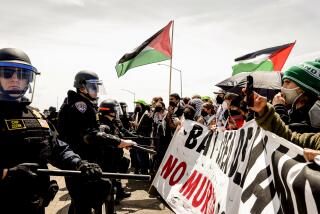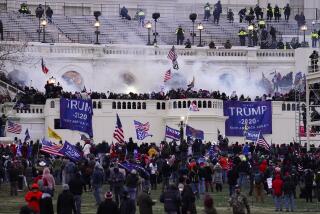‘WINCON 11’ Not Allowed to Put Weapons on Trial
- Share via
The “WINCON 11,” accused of misdemeanor charges stemming from their anti-nuclear demonstration in Costa Mesa last February, had a reason for refusing to plead guilty: they wanted a courtroom to put nuclear weapons on trial.
But on the eve of their trial Tuesday, a Harbor Municipal Court judge decided, almost reluctantly, that he couldn’t let them do it. Judge Christopher Strople ruled that the 11 defendants could not use the defense of necessity--a legal term meaning the defendants wanted to argue that they were compelled to violate the law by the need to forestall a nuclear holocaust.
But Strople “invited” defense attorney James Egar to appeal his decision to Superior Court, or even a higher court, to get a clarification.
Strople said later that California courts have set stringent grounds for the use of the defense of necessity and added, “I don’t think as a municipal court judge I should be breaking new ground on the issue.”
Forty-seven people were arrested at the three-day annual Winter Conference of Aerospace and Electronics Systems--known by the name WINCON and sponsored by the U.S. Department of Defense--at the Westin South Coast Plaza Hotel. On the first two days of the conference, 44 were arrested for blocking the buses that arrived to take conference participants to the El Toro Marine Corps Air Station. Three more were arrested the third day for blocking the hotel entrance.
Served Jail Time
All but 11 pleaded either guilty or no contest to the misdemeanor charge of blocking public access. They were ordered either to do 25 hours of community service or were given credit for time they served in the Orange County Jail, which amounted to five days for some.
But the 11 holdouts said they refused to plead guilty because they hoped to attract news media attention by taking the case to trial.
“I saw the kind of press attention given to those who pleaded guilty: It was almost nothing,” said Liz Crawford, one of the WINCON 11, as they have dubbed themselves. “I wanted to get the issue of nuclear weapons before the public, and this seemed the best way to get attention for it.”
Egar, their attorney, agreed that if Strople had not blocked him he would have put the nuclear proliferation issue on trial. In presenting a defense of necessity, he was prepared to call several nuclear experts to testify about the dangers of nuclear weapons and their growth in the United States.
The next task, he said, will be to get the Superior Court to side with him, or if necessary, an even higher court.
“These defendants are of high moral character with strong personal convictions,” Egar said. “They believed that there was a threat of imminent peril from nuclear weapons” the day they were arrested.
Questions Claim
The Orange County district attorney’s office doesn’t agree. Deputy Dist. Atty. Bob Thomas, a spokesman for its Harbor Court office, said the defendants were stretching the immediate peril claim “to the breaking point.”
“This is a court of law,” Thomas said. “Political questions are more appropriately handled in the political arena, which is functioning and available, therefore a more appropriate forum than a courtroom.” Thomas added that courtrooms are a place where narrow issues of innocence or guilt are decided, based on specifics.
Strople, however, said Egar’s proposed defense met five of the six criteria that appellate courts have set down for putting a defense of necessity before a jury.
The criteria, Strople said, are these:
-In the defendants view, was the act of civil disobedience committed to prevent a significant evil?
- Were the accused noncontributors to this perceived evil?
- Was the harm caused by the act far smaller than the harm it was meant to avoid?
- Did the accused believe in good faith that the act was necessary?
- Was that belief objectively reasonable?
- Were there no adequate alternatives to their actions?
Strople said he was satisfied that Egar’s defense met the first five criteria. As for the sixth, he said, Egar’s reply “probably has some merit.”
Egar’s answer was that the WINCON 11 felt they had no adequate alternatives because demonstrating without being arrested had not gained any media attention for their cause in the past. Their arrest was the only way they could gain access to the public through the media, Egar argued.
More to Read
Sign up for Essential California
The most important California stories and recommendations in your inbox every morning.
You may occasionally receive promotional content from the Los Angeles Times.












